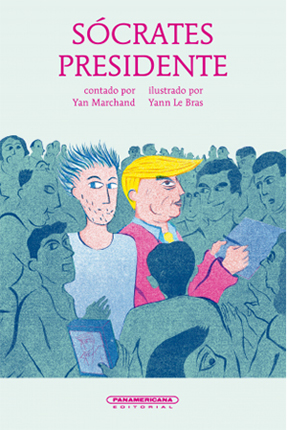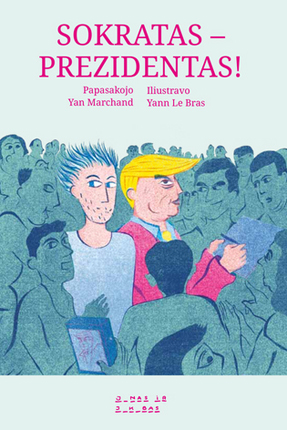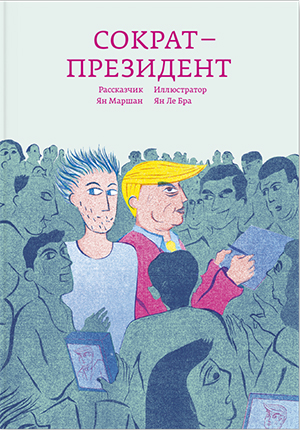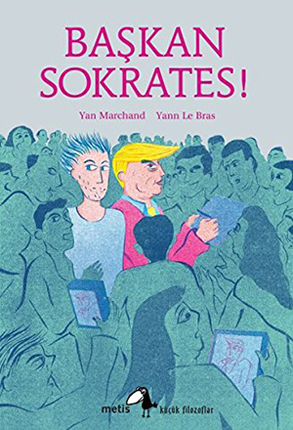HEADLINER
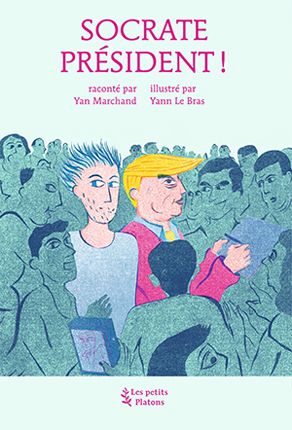
Children's Books
PRESIDENT SOCRATES!
After Donald Trump was elected, the publishing house released Socrate Président ! (President Socrates!) with the infamous master of the rhetoric and adversary of Socrates, Gorgias, who bears a resemblance to the American president.
Les Petits Platons have been publishing the works of the great philosophers for ten years: illustrated books that introduce Kant, Lao-Tzu, Descartes to readers 9 to 99. After Donald Trump was elected, the publishing house released Socrate Président ! (President Socrates!) with the infamous master of the rhetoric and adversary of Socrates, Gorgias, who bears a resemblance to the American president. Thanks to their creative marketing strategies, the book quickly found an audience in Europe, Asia and Latin America, explains Jean-Paul Mongin, founder of Les Petits Platons
BIEF: To explain Plato's philosophies, you created an original scenario: Socrates, "the wisest and most honest philosopher" is sent back to Earth to become president and make people better. But since his slogan "Better to suffer injustice than to commit it" is not a seller, he must rely on the help of Gorgias who manipulates the unscrupulous mob and resembles Donald Trump. How did you get this idea?
J.-P. M.: This whole story starts with a very concrete problem: the Underworld is overflowing. Every day millions of corrupt souls are pouring into it, and Minos, who rules over it, no longer knows where to put them all. He goes in search of Socrates, who is spending his death basking in the sun of goodness and righteousness, to ask him to return to the present world to be elected president and to bring his fellow citizens back in line through his virtuous example and by enacting proper laws. At first, Socrates was not very enthusiastic about entering politics. It’s true, that the last time he did, it ended rather badly! But Minos offers to provide him with an adviser capable of getting anyone elected and who will pull up from the depths of the Underworld the most corrupt soul of them all, the infamous Gorgias...
BIEF: So you took the famous dialogue on rhetoric between Socrates and Gorgias, which dates back to the 5th century BC and was reported by Plato in his book The Gorgias, and adapted it to the context of Trump's election campaign. Who was this Gorgias and in what way does he resemble Trump?
J.-P. M.: Included in several of Plato’s dialogues, Gorgias is a sophist, that is, a master of rhetoric whose discourse is not about telling the truth but persuading his audience. His manipulation of language, denounced by Plato twenty-five centuries ago, is obviously quite contemporary. But when we proposed that the book’s illustrator, Yann Le Bras, have Gorgias resemble the American president, it was just a little wink that was added at the end of the editing process. The book is not devoted to Donald Trump, it actually presents platonic criticism of the evolution of democracies, where political discourse is always at the risk of being hijacked and misused to flatter the lowest common denominator in a crowd.
BIEF: How is Socrates' philosophy in complete contradiction with the values of our time?
J.-P. M.: When they arrive in our epoch, Socrates and Gorgias-Trump start off by searching for the agora, a city’s central public gathering place where citizens gather to talk about the city’s affairs, which is also the marketplace. Unable to find it, they eventually discover huge "supermarket" in the outskirts of the city. They enter and start their election campaign. Socrates is completely stunned by the display of the vast quantities of goods and the customers who eagerly fill their carts, like an extension of their stomachs. Contemporary society’s consumerism is as un-Socratic as things can get, and author Yan Marchand thus implies that it has taken the place of politics! Gorgias, on the other hand, gloats in this world of abundance where primal instincts have been liberated; he immediately understands how he can take advantage of these impulses and give them a political spin. Through using images and networks, he will manipulate these vile passions to seize power.
BIEF: The book was released in 2017, shortly after Trump was elected. How did French readers react?
J.-P. M.: The book was released a few weeks after the November 2016 U.S. presidential election. I think it was the very first children’s book with a protagonist inspired by Donald Trump! For the launch at the Paris Book Fair in March 2017, we rented the poster space above all the urinals, and put up a campaign poster adapted to the book, where we see Gorgias-Trump with his slogan: "Free your desires!" It made a lot of people laugh and drew many visitors to the booth.
BIEF: How have you promoted this title in France?
J.-P. M.: Socrate Président ! is the first book in the "Les petits Platons’" collection that we have released as an ebook for free download. This has significantly boosted our sales of paper copies. Readers discovered the album online because it was free, and since they liked it, they then bought it for themselves or as a gift. Contrary to what one might fear, there was no cannibalization of the paper book sales by the free ebook offer, or if there was some, it was more than offset by the additional readers we reached with the offer. We had just over 20,000 downloads of the ebook, which also allowed us to expand our contact list. We reprinted the book twice and have sales of around 9,000 copies to date. I should point out that at the time, we were distributing it ourselves, so it was, for us, a nice success!
BIEF: In which countries have you sold the rights? Has the book been published in the United States?
J.-P. M.: Socrate Président ! which is based on the subject developed in Gorgias, is part of the collection of 4 titles devoted to the adaptation of Plato's dialogues, along with La Mort du divin Socrate (The Death of the Divine Socrates) (adapted from the Apology of Socrates and the Phaedo), Socrate est amoureux (Socrates is in Love) (adapted from Symposium), Socrate sort de l'ombre (Socrates Comes out of the Shadows), (Republic). This mini-series has been published, or is currently being published, in Japan, Korea, Portugal, Croatia, Turkey, Brazil, Italy, Spain, China, Albania, Russia, Spanish-speaking Latin America, Germany... Moreover, our fantastic German publisher, Diaphanes Verlag, also publishes our books in English, as part of a partnership with the University of Chicago Press: the first volumes have been released, but the health crisis unfortunately delayed the publication of Socrate Président !
BIEF: How did the sales happen?
J.-P. M.: Most of our foreign publishers release the collection in title release order. They regularly invite us to help promote new releases when they appear in their markets. It is more like a partnership than a simple sales relationship. We have what is akin to a small community of publishers from around the world: we all exchange ideas for launches, communication materials, educational support materials... It is this international ecosystem that has protected us somewhat from the French crisis because even though rights’ sales have slowed and shows and fairs have been cancelled, royalties from last year’s sales continue to come in.
BIEF: Les Petits Platons are celebrating their 10th anniversary this year. You waited until this anniversary to publish a book on Nietzsche whose rights you have sold in ten countries, even before it was published in France. How do you explain this success?
J.-P. M.: The "petit Plato" dedicated to Nietzsche is, in France and abroad, the most anticipated title of the series. This is due to the exceptional notoriety of this philosopher, who is widely read around the world, and far from only in academic circles. And our book, titled Ainsi parlait Nietzsche (Thus Spoke Nietzsche),is objectively one of the jewels of the collection. Its author, Nathalie Prince, an academic well-known in the world of children's literature, has, together with her husband Christophe Prince, done a remarkable job of adapting Thus Spoke Zarathustra, so as to make it accessible to children while maintaining the masterpiece’s poetic power. And Yann Damezin's illustrations are simply fabulous. I really hope that this title will open the doors to a few countries where the collection has not yet been sold!
Interview by Katja Petrovic
October 2020
After Donald Trump was elected, the publishing house released Socrate Président ! (President Socrates!) with the infamous master of the rhetoric and adversary of Socrates, Gorgias, who bears a resemblance to the American president.
Les Petits Platons have been publishing the works of the great philosophers for ten years: illustrated books that introduce Kant, Lao-Tzu, Descartes to readers 9 to 99. After Donald Trump was elected, the publishing house released Socrate Président ! (President Socrates!) with the infamous master of the rhetoric and adversary of Socrates, Gorgias, who bears a resemblance to the American president. Thanks to their creative marketing strategies, the book quickly found an audience in Europe, Asia and Latin America, explains Jean-Paul Mongin, founder of Les Petits Platons
BIEF: To explain Plato's philosophies, you created an original scenario: Socrates, "the wisest and most honest philosopher" is sent back to Earth to become president and make people better. But since his slogan "Better to suffer injustice than to commit it" is not a seller, he must rely on the help of Gorgias who manipulates the unscrupulous mob and resembles Donald Trump. How did you get this idea?
J.-P. M.: This whole story starts with a very concrete problem: the Underworld is overflowing. Every day millions of corrupt souls are pouring into it, and Minos, who rules over it, no longer knows where to put them all. He goes in search of Socrates, who is spending his death basking in the sun of goodness and righteousness, to ask him to return to the present world to be elected president and to bring his fellow citizens back in line through his virtuous example and by enacting proper laws. At first, Socrates was not very enthusiastic about entering politics. It’s true, that the last time he did, it ended rather badly! But Minos offers to provide him with an adviser capable of getting anyone elected and who will pull up from the depths of the Underworld the most corrupt soul of them all, the infamous Gorgias...
BIEF: So you took the famous dialogue on rhetoric between Socrates and Gorgias, which dates back to the 5th century BC and was reported by Plato in his book The Gorgias, and adapted it to the context of Trump's election campaign. Who was this Gorgias and in what way does he resemble Trump?
J.-P. M.: Included in several of Plato’s dialogues, Gorgias is a sophist, that is, a master of rhetoric whose discourse is not about telling the truth but persuading his audience. His manipulation of language, denounced by Plato twenty-five centuries ago, is obviously quite contemporary. But when we proposed that the book’s illustrator, Yann Le Bras, have Gorgias resemble the American president, it was just a little wink that was added at the end of the editing process. The book is not devoted to Donald Trump, it actually presents platonic criticism of the evolution of democracies, where political discourse is always at the risk of being hijacked and misused to flatter the lowest common denominator in a crowd.
BIEF: How is Socrates' philosophy in complete contradiction with the values of our time?
J.-P. M.: When they arrive in our epoch, Socrates and Gorgias-Trump start off by searching for the agora, a city’s central public gathering place where citizens gather to talk about the city’s affairs, which is also the marketplace. Unable to find it, they eventually discover huge "supermarket" in the outskirts of the city. They enter and start their election campaign. Socrates is completely stunned by the display of the vast quantities of goods and the customers who eagerly fill their carts, like an extension of their stomachs. Contemporary society’s consumerism is as un-Socratic as things can get, and author Yan Marchand thus implies that it has taken the place of politics! Gorgias, on the other hand, gloats in this world of abundance where primal instincts have been liberated; he immediately understands how he can take advantage of these impulses and give them a political spin. Through using images and networks, he will manipulate these vile passions to seize power.
BIEF: The book was released in 2017, shortly after Trump was elected. How did French readers react?
J.-P. M.: The book was released a few weeks after the November 2016 U.S. presidential election. I think it was the very first children’s book with a protagonist inspired by Donald Trump! For the launch at the Paris Book Fair in March 2017, we rented the poster space above all the urinals, and put up a campaign poster adapted to the book, where we see Gorgias-Trump with his slogan: "Free your desires!" It made a lot of people laugh and drew many visitors to the booth.
BIEF: How have you promoted this title in France?
J.-P. M.: Socrate Président ! is the first book in the "Les petits Platons’" collection that we have released as an ebook for free download. This has significantly boosted our sales of paper copies. Readers discovered the album online because it was free, and since they liked it, they then bought it for themselves or as a gift. Contrary to what one might fear, there was no cannibalization of the paper book sales by the free ebook offer, or if there was some, it was more than offset by the additional readers we reached with the offer. We had just over 20,000 downloads of the ebook, which also allowed us to expand our contact list. We reprinted the book twice and have sales of around 9,000 copies to date. I should point out that at the time, we were distributing it ourselves, so it was, for us, a nice success!
BIEF: In which countries have you sold the rights? Has the book been published in the United States?
J.-P. M.: Socrate Président ! which is based on the subject developed in Gorgias, is part of the collection of 4 titles devoted to the adaptation of Plato's dialogues, along with La Mort du divin Socrate (The Death of the Divine Socrates) (adapted from the Apology of Socrates and the Phaedo), Socrate est amoureux (Socrates is in Love) (adapted from Symposium), Socrate sort de l'ombre (Socrates Comes out of the Shadows), (Republic). This mini-series has been published, or is currently being published, in Japan, Korea, Portugal, Croatia, Turkey, Brazil, Italy, Spain, China, Albania, Russia, Spanish-speaking Latin America, Germany... Moreover, our fantastic German publisher, Diaphanes Verlag, also publishes our books in English, as part of a partnership with the University of Chicago Press: the first volumes have been released, but the health crisis unfortunately delayed the publication of Socrate Président !
BIEF: How did the sales happen?
J.-P. M.: Most of our foreign publishers release the collection in title release order. They regularly invite us to help promote new releases when they appear in their markets. It is more like a partnership than a simple sales relationship. We have what is akin to a small community of publishers from around the world: we all exchange ideas for launches, communication materials, educational support materials... It is this international ecosystem that has protected us somewhat from the French crisis because even though rights’ sales have slowed and shows and fairs have been cancelled, royalties from last year’s sales continue to come in.
BIEF: Les Petits Platons are celebrating their 10th anniversary this year. You waited until this anniversary to publish a book on Nietzsche whose rights you have sold in ten countries, even before it was published in France. How do you explain this success?
J.-P. M.: The "petit Plato" dedicated to Nietzsche is, in France and abroad, the most anticipated title of the series. This is due to the exceptional notoriety of this philosopher, who is widely read around the world, and far from only in academic circles. And our book, titled Ainsi parlait Nietzsche (Thus Spoke Nietzsche),is objectively one of the jewels of the collection. Its author, Nathalie Prince, an academic well-known in the world of children's literature, has, together with her husband Christophe Prince, done a remarkable job of adapting Thus Spoke Zarathustra, so as to make it accessible to children while maintaining the masterpiece’s poetic power. And Yann Damezin's illustrations are simply fabulous. I really hope that this title will open the doors to a few countries where the collection has not yet been sold!
Interview by Katja Petrovic
October 2020
